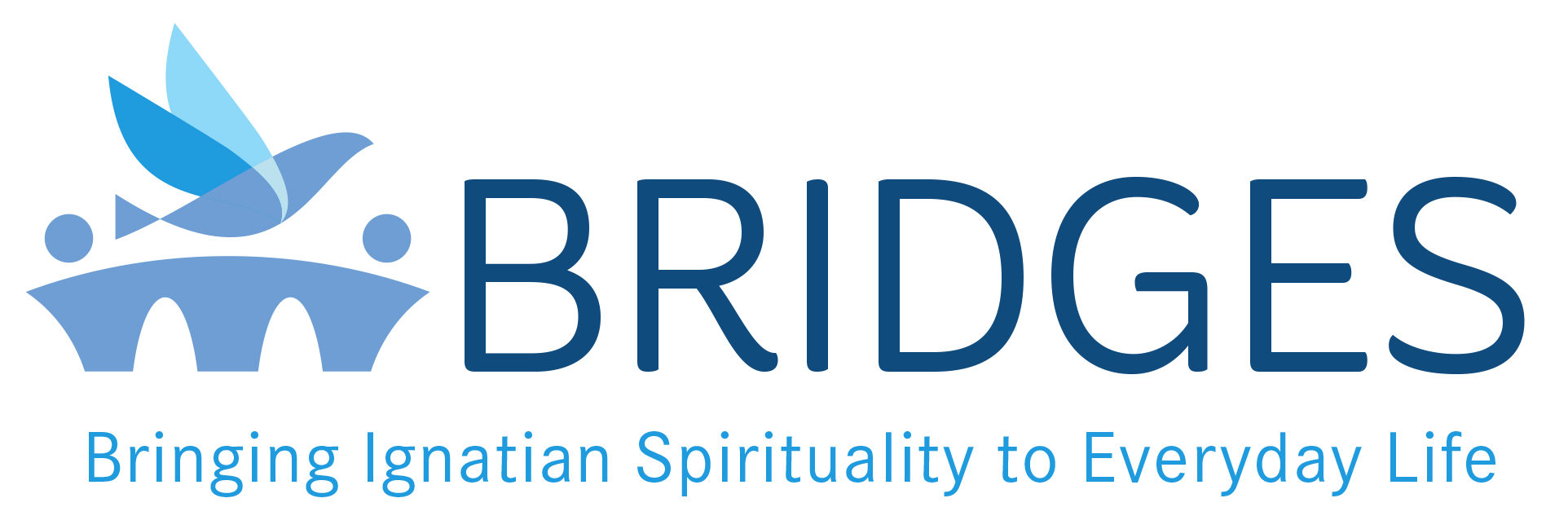
By Steve Givens, executive director
For many in the Bridges community, praying the daily awareness examen has become part of our daily routine, a crucial pause for prayer that frames our days and leads us to gratitude. Below is a shortened version of a presentation I gave for the Magis program in November. I hope it will serve as a reminder of just how critical this prayer is to our spiritual development. It’s a prayer that St. Ignatius says we should pray every day, even if we have time for no other prayer.
For more information on the “nuts and bolts” of this prayer, I recommend a visit to this website.
The Examen is the work of paying attention and being open, of connecting the simple facts of our lives with a greater sense of presence, of recognition of the small within the whole, of finding God in the things and actions of the Earth and of our own lives. It’s not hard, but it takes intention.
It is our work. It is the examined life. It is life examined through the lens of God. It is trying to see our lives as God sees us. It is both examining and being examined, and that is the beauty of it all. It is, as the poet Mary Oliver writes in her poem “The Messenger,” what matters, which is my work, which is mostly standing still and learning to be astonished.
The opposite of a daily examen is living what Socrates called the “unexamined life,” and he said it is not worth living.
NOT paying close attention to what’s going on around us, REFUSING to be aware of the blessings and presence of God in our everyday lives, and NOT being willing to “be astonished,” could all very well be the direst temptations we face.
After all, we’ve seen it all, we think. There’s nothing new under the sun, we think (especially as we grow older), so why pay attention? Another day is just another day if we don’t watch for something that will make it different.
So we settle into life, yawning at the sunrise instead of being astounded by it, blinking through the beauty of garden and field instead of standing in awe, ho-humming our way through all that we have learned to take for the ordinary and deserved. A meal becomes mere sustenance instead of a small daily feast. The family visit perfunctory instead of a blessing. A work of art only decoration or mindless entertainment instead of a revelation of God’s presence in the world. Without attention, without presence and purpose (our own and our acknowledgement of God’s) we risk allowing life — and God’s presence in it — to sweep over our heads virtually unnoticed. We live without gratitude not because we don’t care to say thank you but because we’re unaware of the gifts we have received.
It’s for this reason that the Examen has become an important daily prayer practice for so many of us. It’s a prayer that forces us to slow down and pay attention, a prayer that ends with that most powerful of prayers: “Thank you.”
The examen is more than just rewinding the video tapes of our lives, more than just reliving our time in our mind’s eye, although it begins there. In Margaret Silf’s book, “Inner Compass: An Invitation to Ignatian Spirituality,” she talks about using the examen to track our “moods” and our orientations toward or away from God. She describes the work of the examen as, “replaying the time under review prayerfully, and allowing the dominant moods of that period to surface again.”
Next, she suggests, we allow God to lead us down into the real roots of those feelings and moods. We track our moods to discover deeper movements, deeper desires, deeper unease, and deeper moments of consolation and desolation.
If we felt rage or apprehension, we need to do the hard work of prayerfully considering where those feelings came from. Can we put a name on it?
She refers to the Examen as, “Her Day with God,” that asks two basic questions: Where was God today and how was God today?
Fr. Joe Tetlow asks a similar question when describing the examen: “How do things stand between me and God?” It’s that same question I asked as a young man when I felt dis-ease and wanted some peace.
The Examen is an invitation to the graced experience of finding the extraordinary and holy in the ordinary and mundane moments of our lives.
As Rabbi Harold Kushner once said, “Can you see the holiness in those things you take for granted – a paved road or a washing machine? If you concentrate on finding what is good in every situation, you will discover that your life will suddenly be filled with gratitude, a feeling that nurtures the soul.”
It is a prayer that, ultimately, leads us to ask questions like:
- Can I greet the day with expectation and a sense of wonder and surprise?
- Can I begin the day with gratitude for all the blessings and opportunities in my life?
- Can I live each day available to those around me?
Below is a music video for my song, Extraordinary Lives, which I wrote with my songwriting partner Phil Cooper to illustrate the power of this simple daily prayer. Enjoy.

